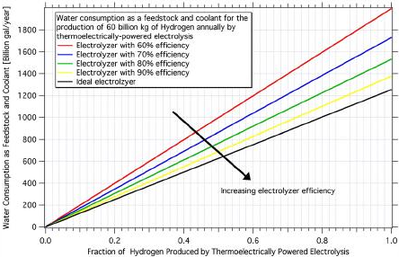OK Gromett Definitions are needed the comment made makes it all seem so simple yet it is far from so, whatever alternate energy system is being used a deep understanding both Physics and Chemistry is required for R&D this comes primarily from research and then spun out commercially. This is in addition to Material Science nothing about alternative fuels is basic other than how something may be described which is normally done by an expert in a field that simplifies something that is complex to make it understandable by the masses (me included), I am not a Chemist, Physicist or Material Scientist and i do not think you are either but have expertise and qualifications in other areas.
The definitions:
a) Chemistry: The science of the composition, structure, properties, and reactions of matter, especially of atomic and molecular systems.
b) Physics: The scientific study of matter and energy and the effect that they have on each other
c) Material Science: The interdisciplinary field of materials science, also commonly termed materials science and engineering, is the design and discovery of new materials, particularly solids.
So suddenly this starts looking more complex which I am sure you would agree, as you also agree that Hydrogen can be used as an energy source it means it can be used for transport which has also been proved, the view your holding is that Batteries are king....maybe, maybe not. We have Petrol, Diesel, LPG, electric and hydrogen powered cars Lorries trains and power plants.
Its a Mix and the world is a better place for not just having one form of power lets see what the future holds my belief is that Hydrogen will have a place, market forces (politics and investors) will influence what is available how and when.
Its all complex and as I say nothing is forever not even Batteries
I am probably more familiar with the sciences and engineering than you give me credit for. I was relying on physics for my claim about Hydrogen being 2-3 times more expensive than direct charging.
A 100% efficient electrolyser would consume 39.4 kilowatt-hours per kilogram (142 MJ/kg) of hydrogen. This is based on the laws of physics. The hydrogen atoms are bonded to oxygen atoms, it takes a specific amount of energy minimum to break this bond (260 kJ per mole of water).
The maximum theoretical energy efficiency of a fuel cell is 83%, operating at low power density and using pure hydrogen and oxygen as reactants. Yes you can get a higher efficiency in a combined heat/power system but that is not practical for vehicles only for stationary large scale systems.
These are physical limitations dictated by the universe. Not matters of opinion or subject to development. These are the figures in a 100% efficient system which is just not possible.
So if you developed a perfect electrolyser and a perfect fuel cell. You would put 39.4KWh of electric in to get 1KG of hydrogen out.
You then put that 1KG of hydrogen into your perfect fuel cell along with pure oxygen, you would get 32KWh back out.
That is in a perfect system with zero losses, no other costs and no other processes required.
In the real world the efficiency of an electrolyser even the best experimental ones are now hitting the 80% mark. However, further energy is then required to compress the hydrogen OR to cryogenically chill it to liquefy it. Then you have to transport it using more electric.
In the car, the BEST we can reach today is 70% efficiency in a fuel cell which is incredible. The rest is wasted as heat. Unless you can figure out a way to utilise that excess heat to create electricity efficiently in a compact way without adding weight to the car this is likely close to where we can get with FC efficiency. These most efficient ones using Alkaline technology require temperatures of 60-70°C and you have to pre-heat them before you can use them, this is more electricity wasted.
So lets take the best case experimental electrolyser and Fuel cell at the moment and ignore compression/chilling and transport costs.
We will use 80% for the electrolyser and 70% for the Fuel cell.
100KWh hours go into the system and you get 80% out of the electrolyser so 80KWh worth of hydrogen. (not compressed or chilled or transported) We then put this straight into a fuel cell.
You get 70% of that 80KWh leaving you with 56KWh.
This is where I get the figures for 2-3 times more expensive. Even if you don't compress/chill/transport the hydrogen it is close to double the cost. My 2-3 times more expensive is me erring on the conservative side. In real terms it will likely be 5+ times more expensive.
That means filling a Hyundai Nexo’s 6.33kg tank will have used at least 249KWh of electric to generate if done at 100% efficiency and didn't need compressing or chilling. This will give you 414 miles of range. In reality it would have used about double that once you take all the other factors and processes into account. But let's play the 100% efficiency game for hydrogen for a bit longer.
A tesla model 3 long range will do around 300 miles in pretty good conditions (it is specced at 348 miles range). But let's take half the battery off because it is winter and no one likes Tesla. So at 174 miles with a 75KWh battery...
For a direct comparison we need to convert to KWh per mile.
Telsa model 3 long range 75KWh / 174 miles (worst case) = 431 Wh per mile.
Nexo 249KWh / 414 miles (in a perfect universe with no losses) = 601 Wh per mile.
In my example here I have not added the electric need to compress and chill the hydrogen, I have not added the cost of recovering the investment of the hydrogen electrolysers or filling stations, I have not added the cost of transporting the hydrogen. Add these all in and the situation for hydrogen looks dire.
That 601 Wh per mile for the Nexo in the real world is likely to be well over 1,000 Wh per mile. The Model 3 figure is likely to be a hell of a lot lower. I beat the crap out of the Tesla and gave the hydrogen every possible advantage even some that just can't happen in the real world.
So there you have it, from Physics, Thermodynamics and some maths to prove my point categorically.
That took quite a bit of time for me to write up, so I would appreciate you doing me the courtesy of reading it and pointing specifically to where I am wrong on the science? Where I got the calculations wrong? And why you think this situation is going to change to make hydrogen practical for cars, vans and most lorries on UK roads? Please don't give me a waffly answer about research this or university that. I have given you science and maths and not pointed you to any other sources to back my position. Now you don't know me, but you might be surprised to know I love being proven wrong on stuff like this. If you can prove me wrong using science and maths and not just nit pick I will be extremely excited and would happily buy you a beer. But if you just waffle and digress to avoid the point, well that's another matter.
Last edited:








